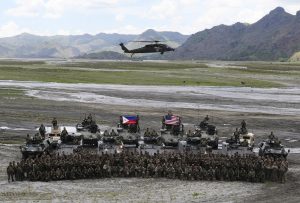The United States and the Philippines will next week open what they are billing as the “most expansive” iteration of the annual Balikatan military exercise, at a time of growing tension around Taiwan and the South China Sea.
More than 16,000 members of the Armed Forces of the Philippines (AFP) and U.S. military will take part in this year’s Balikatan exercise, which runs from April 22 to May 18, the U.S. embassy in Manila said in a statement on Wednesday.
While this is slightly down on last year, the drills will also include contingents from Australia, and for the first time, the French Navy. Another 14 nations will take part as observers.
The exercises will take place in Luzon and Palawan, the areas facing Taiwan and the South China Sea, and will include territorial defense drills and others involving the targeting of simulated enemy forces and the “sinking” of an enemy ship. The Philippine Navy, U.S. Navy, and the French Navy will also conduct a Multilateral Maritime Exercise in the Philippines’ exclusive economic zone (EEZ). This is reportedly the first time that Balikatan exercises will take place outside the Philippines’ 12-nautical-mile territorial waters, where it state has sovereignty and exclusive jurisdiction to both sea and airspace.
While Manila and Washington frequently point out that Balikatan has taken place since 1991 and is not directed at any particular country, the drills come at a time of growing tension in the South China Sea, which has seen China become more aggressive in asserting its “nine-dash line” claim, particularly against the Philippines.
The Chinese attention has centered on Second Thomas Shoal, which sits inside the Philippines’ EEZ and is held by the Philippines by virtue of a warship, the BRP Sierra Madre, that was grounded on the shoal in 1999. Over the past year, the China Coast Guard (CCG) has made repeated attempts to block the Philippine Navy’s attempts to resupply the small detachment of marines stationed aboard the Sierra Madre. This has resulted in several incidents in which Philippine supply boats have been rammed and shot with high-pressure water cannons, in some cases injuring crewmembers.
In the U.S. embassy statement, Gen. Romeo Brawner Jr., the commander of the Armed Forces of the Philippines said that next week’s exercise, “underscores our steadfast dedication to amplify interoperability and readiness by collaborating with our friends, partners, and ally.” Balikatan “is more than an exercise,” added Lt. Gen. William M. Jurney, commander of U.S. Marine Corps Forces, Pacific, who is the U.S. officer responsible in charge of the exercise. “It’s a tangible demonstration of our shared commitment to each other. ”
Needless to say, China has not responded well to the impending military exercise, warning the Philippines, in similar language that it has used throughout the confrontations at Second Thomas Shoal, against any “maritime provocations.”
Chinese foreign ministry spokesperson Lin Jian told a press briefing in Beijing on Wednesday that Manila “needs to be fully aware that when countries outside the region are brought into the South China Sea to flex muscles and stoke confrontation, tensions could get worse and the region will only become less stable.”
The spokesman urged “relevant countries outside the region to stop stoking confrontation” in the South China Sea and said that China will “continue to take necessary measures to firmly safeguard our territorial sovereignty and maritime rights and interests and keep the South China Sea peaceful and stable.”

































